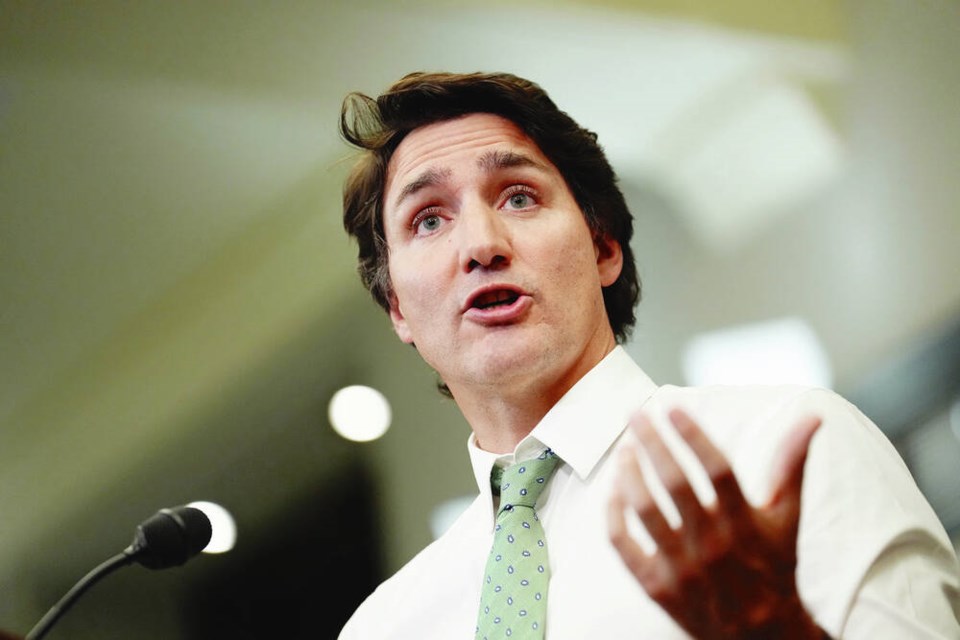In normal times, an Opposition call to cut taxes would be a ho鈥慼um back-page item.
But BC United’s decision on Tuesday to retreat from one of its predecessor party’s most cherished positions could be bigger news than it appears.
It comes just days after Prime Minister Justin Trudeau’s federal carbon tax botch, where he froze it on home heating oil for three years in some regions and boosted support for alternatives that mostly benefit the Maritimes.
It blindsided the sa国际传媒 government, because the provincial carbon tax prevails here and the cut does not apply.
The extreme reaction across sa国际传媒 to playing favourites is intensifying the argument the federal Conservatives started against carbon taxes in general. The entire concept is on much shakier ground than it was a week ago, before Trudeau’s blunder.
sa国际传媒 Opposition Leader Kevin Falcon had purely sa国际传媒 reasons for promising to freeze the carbon tax rate and permanently eliminate provincial fuel taxes (now 15 cents a litre).
The carbon tax was an innovative, world-leading measure 15 years ago that drew praise from many quarters and gave sa国际传媒 major street cred on the environmental front.
But that was then. This is now. BC Liberals introduced it in 2008 at a rate of $10 per tonne of carbon emissions, a rate that equated to two cents a litre at the pump or on a heating-oil bill.
It escalated to $30 a tonne (seven cents a litre) by the time Falcon, BC Liberal finance minister at the time, froze it at that level in 2012. The tax was tied by law to tax cuts elsewhere, so the bottom-line impact on the average taxpayer was minimal at worst.
The NDP rejigged in 2017, abandoned the ties to tax cuts and started the escalator again. It hit $50 a tonne in 2022, $65 a tonne last summer and is scheduled to hit $80 a tonne on April 1.
The plan is to hike it every year for the next several years to $170 a tonne by 2030, with corresponding hikes in tax credits to ease the pain.
The premise behind the BC United retreat is that the world has changed and such increases are simply unbearable, even with some of the costs offset.
The scheduled hikes would theoretically add 23 cents to the current 14 cent-a-litre tax by that point, and corresponding hikes on other fuels.
The carbon tax was invented soon after climate change became a top-of-mind issue and started leading the polls in questions about what voters were worried about.
But inflation, interest-rate hikes and other pressures make cost of living one of the big worries today.
Falcon’s new call is to eliminate 15 cents a litre worth of provincial taxes on gas and remove the carbon tax from heating oil. He also wants it taken off fuel used on farms, to curb food costs.
It means nothing unless he wins the election. But it puts pressure on the NDP to explain the impacts of a carbon tax that is more than doubling in the mid-term, and is starting to look like too much of a good thing.
There’s another federal wrinkle to consider. If the Conservatives win the next federal election and follow through on eliminating the carbon tax, Falcon would do the same to sa国际传媒’s, because going it alone with such a big tax would be economically impossible.
The carbon tax will be one of the battlegrounds in the next federal election, sometime between now and the fall of 2025.
Falcon wants it to feature in next fall’s provincial showdown as well, while Eby has to sidestep questions about whether sa国际传媒 will match the federal cuts. He appeared to rule that out this week, but that could change.
The carbon-tax debate in the legislature now looks like a trapeze act where the acrobats have all changed swings in mid-air and are flying in different directions.
New Democrats, who rejected the tax from day one and once fought an entire election campaign against it (and lost), are now defending it. And former Liberals like Falcon who defended it for years look ready to back away from it.
BC United will be pursuing the steep costs acknowledged in the overall Clean BC plan in coming weeks, to see if affordability is a bigger deal than climate change in voters’ minds.
Note to readers: This story has been corrected. A previous version misstated the amount scheduled carbon tax increases will add to the price of a litre of gas by 2030.
>>> To comment on this article, write a letter to the editor: [email protected]



